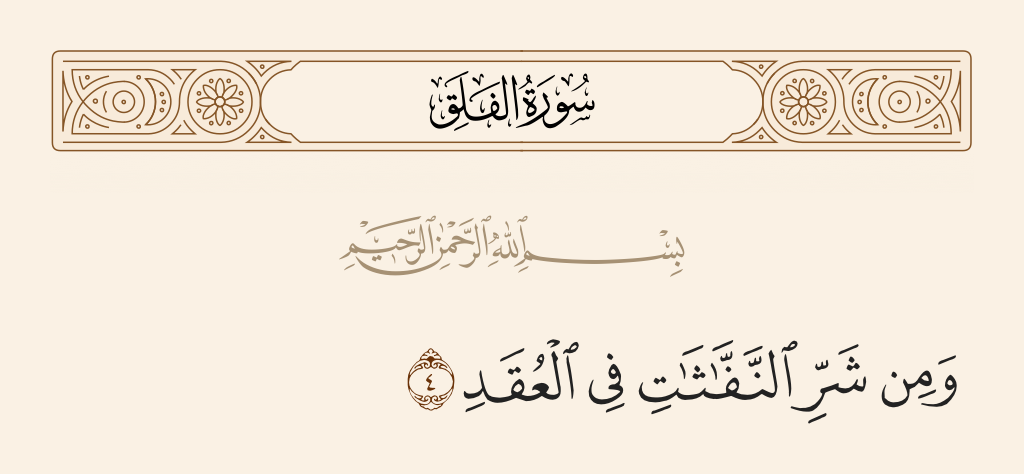Surat Al-Falaq Verse No. 4: Reading and listening
Translation of the verse 4 from Surah Al-Falaq : Number of verses 5 - - page 604 - Part 30.

﴾وَمِن شَرِّ ٱلنَّفَّٰثَٰتِ فِي ٱلۡعُقَدِ ﴿
[ الفلق: 4]
"And from the evil of the witchcrafts when they blow in the knots,
English - Sahih International
And from the evil of the blowers in knots
Tafheem-ul-Quran by Syed Abu-al-A'la Maududi
(113:4) from the evil of the women who blow on knots; *6
Tafheem-ul-Quran by Syed Abu-al-A'la Maududi
*6) The word ' uqad in naffathat frl-'eqad is plural of 'uqdah, which means a knot that is tied on a string or piece of thread. Nafath means to blow. Naftathat is plural of naffathah, which may mean the men who blow much, and if taken as a feminine gender, women who blow much; it may as well relate to nufus (human beings) or to jama ats (groups of men), for both nafas and jama 'at are grammatically feminine. Blowing upon knots, according to most, rather all, comentators implies magic, for the magicians usually tie knots on a string or thread and blow upon them as they do so. Thus, the verse means: "I seek refuge with the Lord of rising dawn from the evil of magicians, male and female." This meaning is also supported by the traditions which show that when magic was worked on the Holy Prophet (upon whom be peace), Gabriel (peace be on him) had come and taught hint to recite the Mu awwidhatayn, and in the Mu'awwidhatayn this is the only sentence which relates directly to magic. Abu Muslim Isfahani and Zamakhshari have given another meaning also of naffathat fil-'uqad, which is that it implies the deceitfulness of women and their influencing men's resolutions, views and ideas and this has been compared to a magic spell, for in the love of women man starts behaving as if he was under a spell. Though this explanation is interesting, it runs counter to the commentary given by the earliest scholars; and it also does not correspond to the conditions in which the Mu awwidhatayn were sent down as we have shown in the Introduction.
About magic one should know that in it since help is sought of the satans and evil spirits or stars to influence the other person evilly, it has been called kufr (unbelief) in the Qur'an: "Solomon was not involved in kufr but the satans who taught tragic to the people." (AI-Baqarah: 102). But even if it dces not contain any word of kufr, or any polytheistic element, it is forbidden and unlawful and the Holy Prophet (upon whom be peace) has counted it among the seven heinous sins which ruin the Hereafter of man. In Bukhari and Muslim a tradition has been related from Hadrat Abu Hurairah, saying that the Holy Prophet (upon whom be peace) said: "Avoid seven deadly sins: associating another with Allah, magic, killing a soul, which AIIah has forbidden unjustly, devouring interest, eating the orphan's property, fleeing from the enemy in the battlefield, and slandering simple and chaste Muslim women with un-chastity."
Source : Al-Falaq Verse 4: And from the evil of the blowers in knots